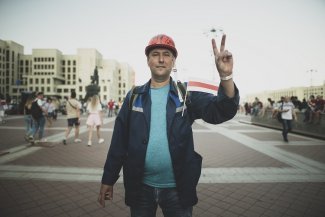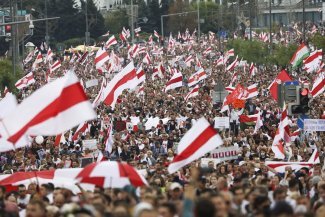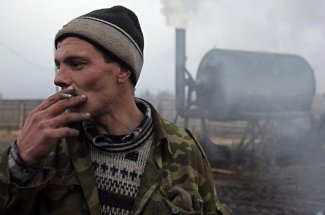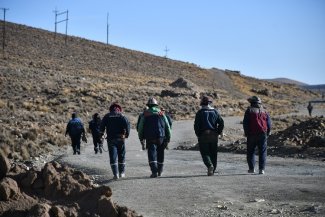Striking workers gather outside of the Minsk Automobile Plant on 17 August 2020. Between 17 and 18 August 2020 thousands of workers went on strike in support of fresh elections and other democratic reforms in Belarus.
It has been over one year since the disputed presidential election took place in Belarus, but the disquieting aftershocks of 9 August continue to rumble on. The former Soviet state has been in turmoil ever since President Aleksandr Lukashenko, who has been in power for the past 27 years, claimed a landslide victory despite widespread evidence that the election was neither free nor fair and that opposition leader Svetlana Tikhanovskaya was the likely winner.
Before the election results were even announced, tens of thousands of people spontaneously gathered to peacefully protest the conduct of the election and to oppose the Lukashenko regime. The days that followed (9-11 August) were the most violent period in the country’s recent history: up to 7,000 protesters were arrested, many of them beaten and tortured by security forces, with three people dying at the hands of police. Then, between 17 and 18 August, workers across the country took part in strike action to support the democratic protests. Although protests continued until November, and despite international condemnation, Lukashenko refused to concede instead, more than 35,000 people have been arrested over the past year; opposition politicians, trade unionists, journalists, members of civil society, human rights lawyers and protesters have all been targeted with criminal prosecutions, and strict new laws have been introduced to further impede everything from press freedom to freedom of association. Scores of activists have fled the country, and dissents in exile have been kidnapped or found dead.
Protests, walk-outs and work stoppages from workers at some of Belarus’s biggest heavy industries – such as Belaruskali, the world’s largest potash (potato fertiliser) producer, and the Minsk Wheeled Tractor Plant (MZKT), where Lukashenko was famously heckled by factory workers – played a key role in this moment.
Workers formed strike committees to prepare for a general strike in support of democratic change. Their demands were simple: fresh elections, the release of all political prisoners, an independent investigation into police violence, a guarantee that protesting employees would not be persecuted by employers and state authorities, and an end to the system of short-term job contracts that dominates Belarus’s economy.
On the one-year anniversary of the start of the protests, Julia Sliuko, a plasterer at Hrodnaprambud, a state-owned construction company in the western city of Grodno (also known as Hrodna), remembers the week that changed everything. Until last year, she says she was apolitical, focusing her energy on raising her 12-year-old son. But that changed last August when she witnessed police beat an unarmed man shortly after the disputed poll. Over the following days Julia spoke to co-workers, many of whom were also beaten by police, about current events. “After witnessing this violence, I understood that nothing would be the same anymore. I felt change in the air.” A few days later she would be elected as chairperson of her company’s strike committee and would later stand on stage in front of thousands of Grodno citizens to speak about how the company management tried to suppress the strike: “They tried to send us on vacation or even suggest money. But we are not for sale. We are with you,” she told the crowd.
These spontaneous assemblies took place all over Belarus for several days in August, during which time dozens of enterprises saw workers going on strike. “We hoped that justice would prevail,” says Julia when asked why she and her colleagues went on strike. “We hoped that law enforcement would not continue to go against the people.” At Belaruskali, for example, which is one of the most successful state-owned companies in Belarus, almost 6,200 of the company’s 17,000 workers supported the idea of post-election strike action (although after coming under significant pressure, only 140 workers actually went on strike). On 10 September, Belaruskali miner and Belarusian Independent Trade Union (BITU) member Yury Korzun chained himself to a piece of mining equipment 305-metres below ground: “I wanted to inspire my colleagues to join the strike. How could I work, when the money we bring to this company goes to law enforcement, who beat peaceful people? To not take action is to put the life of my family at risk,” Yury tells Equal Times.
“It wasn’t a strike, it was a revolt”
President Lukashenko was elected as Belarus’s first post-Soviet president in 1994 and is currently serving his sixth term. Since he took power there has not been a free or fair election, there is no separation of power between the executive, the judiciary, and the legislature, the media is tightly muzzled, and opposition politicians and journalists are routinely jailed. It has become nearly impossible to publicly express political views which oppose Lukashenko’s: since 2019, protest organisers are obliged to provide local authorities with at least 10 days’ notice for any kind of rally; they also have to pay for utilities, medical assistance and police security, with the latter costing up to €2,500 for an assembly of more than 1,000 people. In a country where the average monthly salary is €473, this puts legal protests and rallies out of the reach of most working people.
Organising an authorised strike is just as difficult. “Legally, there is the right to strike, but in reality, it is not feasible,” says Maxim Pazniakou, chairman of the BITU. Before calling a strike, a trade union must have exhausted all possible solutions, such as negotiations with the employer, which have no time limit according to law. For a strike to be legal, it must be backed by over 50 per cent of workers and organisers must approve the strike with several governmental bodies, giving them a minimum of two weeks’ notice. In addition, a strike can be deemed illegal by authorities at any stage. “In August last year, no one knew how to organise a strike, says Aliaksandar Yarashuk, president of the Belarusian Congress of Democratic Trade Unions (BKDP). “The last one happened back in 1995. As a result, most active strikers were at those enterprises where independent trade unions are present. Because only they knew how to organise a strike,” he explains.
When in August 2020 workers called for strike action in support of the pro-democracy protests, many employers responded by saying that because the workers’ demands were political and nothing to do with pay or working conditions, employers had no obligation to respond to their demands.
However, as more than 65 per cent of all industrial products in Belarus are produced by fully or partially state-owned enterprises, the potential that workers have to use democratic organisations (trade unions) to advance democratic reform in the political sphere is significant. “What happened in August wasn’t a strike, it was more like a revolt. The state took all possibilities from workers to strike legally, but they still have the civil right to do so,” says Yarashuk. In response, the regime cracked down on striking workers with threats, arrests and sackings. For example, Julia from Hrodnaprambud was fired at the beginning of September. Dozens of her co-workers quit in solidarity.
Most trade union members in Belarus (four million) belong to the state-aligned Federation of Trade Unions of Belarus (FTUB), a relic of the Soviet system complete with the participation of government ministers in the union’s decision-making bodies. About 10,000 workers are currently represented by the independent BKDP. Paradoxically, while in the aftermath of the pro-democracy uprising more and more workers are joining independent unions, these unions are operating in a shrinking space. As outlined in the 2021 International Trade Union Confederation (ITUC) Global Rights Index: “Several union offices were raided [following the 9 August election], and the police have been forcing unions to hand over personal information about their members, causing serious concern about action against people who have exercised their right to join a union. Union representatives were abducted on their way to work by security services and subjected to interrogation and arbitrary detention. Workers were sentenced to long prison sentences for supporting strike action and protests.”
According to new labour law amendments, which were brought into force this summer, strikes with political demands are now illegal. It is also forbidden to organise a strike at enterprises where hazardous manufacturing takes place and workers can now be fired for simply calling a strike. At its annual International Labour Conference in June 2020, the International Labour Organization (ILO) strongly criticised the violation of international labour standards taking place in Belarus, calling on the Belarusian authorities to reinstate workers, drop all charges related to participation in protests and to make new amendments to protect workers and trade union activists against discrimination, but Lukashenko’s government rejected the findings and today remains bullish. “We are running out of means to defend our members,” says Andrei Hanevich, leader of the independent trade union at GrodnoAzot, a chemical state-owned enterprise. “Employers can do anything they want.”
“A modern form of slavery”
Under Lukashenko, a raft of neoliberal labour laws have been brought in to create flexibility. For example, since 1999, Belarusian labour law has allowed for a maximum employment contract of just five years. As a result, many employers tend to extend contracts from year to year, which means workers have little to no job security and are constantly afraid of losing their jobs. On the other hand, employees cannot leave a job before the end of their contracted term, if an employer doesn‘t agree to it. “This system is one of the reasons why our labour code is one of the worst in Europe. We call it a modern form of slavery,” says Yarashuk.
Moreover, according to the new amendments it is now legal to fire an individual if they serve an administrative term [editor’s note: in Belarusian law, offenses can be given criminal or administrative punishments, such as a fine or a short jail term]. For example, thousands of people were punished with up to 15 days imprisonment for taking part in demonstrations; under Belarusian labour law this is now treated as the sackable offense of truancy. “Last autumn many workers were fired due to their administrative term. We are suing many such employers because at that time it was illegal,” says Pazniakou. One such worker who got fired this way is the miner Yury Korzun. The day he chained himself underground was his last working day; he later served two 15-day prison terms in a row and in the winter, he spent a further month in prison.
The majority of people who went on strike were fired from their jobs and many enterprises like GrodnoAzot have refused to extend the contracts of workers active in the protests. “Last year state enterprises fired people not because they were in breach of contract or for being unprofessional, but because they were politically disloyal,” says Yarashuk. The local branch of the BITU tried to initiate negotiations with factory management and persuade them to reinstate (according to the union) illegally fired employees. In July Belarusian media reported that GrodnoAzot need more than 350 workers. “There is definitely a big lack of staff. It looks like they have a list of people, with whom they will not extend contracts,” says Hanevich.
The dissolution of independent trade unions?
Independent trade unions are in a very precarious position in Belarus. Over the past few months authorities have practically destroyed the free media, arresting almost 30 journalists. More than 50 NGOs have been dissolved, among them not only human rights groups, but also charitable organisations. “We are expecting the dissolution of independent trade unions any moment now,” says Yarashuk. Last month the offices of the Belarusian Radio and Electronic Industry Workers’ Union were raided by the police and its chairperson was forced to leave the country. In addition, Mikola Sharah, the chairperson of the Free Trade Union of Belarus and human rights activist was arrested and detained for three days as a suspect in a criminal case about ‘damage of property’, resulting in the confiscation of his computers and mobile phones. “Recently our branches in the towns of Polatsk and Pinsk were refused to get registration. The same could happen in [the town of] Bobruisk,” says Sharah.
Last autumn, hundreds of new members joined the independent trade unions, with – according to the BKPD – state trade unions losing about 20 per cent of their members. Some of those workers, like Siarhei Lapunou, joined independent structures instead. Lapunou worked at the state-owned oil refinery Naftan and used to be an FTUB member, but after the election he no longer wanted to support a pro-Lukashenko organisation: the chairperson of the FTUB, Mikhail Orda, managed Lukashenko’s election campaign and the union forced workers to sign for Lukashenko’s candidacy as presidential candidates need to gather at least 100,000 signatures.
At Naftan, Lapunou says that many members of the independent trade union are discriminated against: they are threatened with dismissal and the deprivation of bonuses if they stay in the ‘wrong’ trade union.
“Independent trade unions are great things, but only when they function in a state of law. In our country, the law doesn‘t work any more,” Lapunou laments.
After protests broke out at state factories Lukashenko visited some of them himself and personally tried to calm down workers. He addressed workers on stage at MZKT, only to be told to “go away!” by some of the crowd. Of the incident, Yarashuk says: “Lukashenko understood that workers are the only force, thanks to which state power can be transferred peacefully. It was big psychological trauma for him at MZKT and we are still experiencing the consequences of this,” he says, citing labour law amendments and the repression faced by independent trade unions, union activists and workers as examples.
So, with Lukashenko still in power one year later, did the strikes change anything? For Yarashuk, the strikes were successful in weakening Lukashenko’s political position. “He now knows that almost 70 per cent of the workers don’t trust the authorities.” There are other bright spots, too: some of the workers fired from Belaruskali have been reinstated showing that even in a repressive environment, gains can be achieved through collective action; and fledgling independent trade unions have been formed in the healthcare and education sectors.
But overall, those who rose up against Lukashenko have paid a heavy price. Many new members of independent unions are under pressure from employers to leave, which keeps member numbers low, and the labour movement has lost many unions at many factories (such as the Minsk Automobile Plant and MZKT) because activists and members were fired since August 2020. Yarashuk is positive that now that the seed of independent trade unions has been planted, at some point they will flourish: “They can dissolve the unions, but they can’t destroy the idea.”
In the meantime, many of the strikers have been forced to leave the country. Julia Sliuko went to Poland with her son in October last year to avoid a jail term. She now works as a manicurist and organises protests in the Polish capital of Warsaw. Siarhei Lapunou from Naftan left for Poland two months ago, and together with other strikers, he survives by doing odd jobs. One of his friends, Valery, who also took part in the 2020 strikes, is a father of three children, one of whom has a disability. Although things aren’t easy in Poland, he plans to remain in exile until Lukashenko is gone: “I know we will return to Belarus some day, but I understand that victory may not come soon.”













